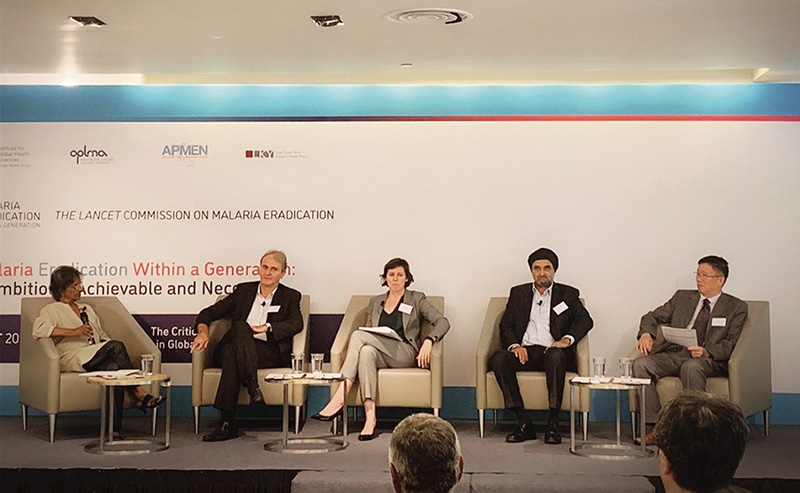Commission spearheads malaria fight
 |
| Asia Pacific nations are making big strides in ending the scourge of malaria |
Recent East Asia summits saw regional heads of government and foreign ministers resolve to eliminate malaria in the region in the next ten years. The commitment, along with relevant resources, is leading to plummeting malaria case numbers and death rates across the region.
The Asia-Pacific launch of the Lancet Commission’s seminal report, held on October 8 at the National University of Singapore, displayed existing evidence with new epidemiological and financial analyses to demonstrate that eradication of the disease is possible within a generation if the right tools, strategies, and funding are deployed. Authored by 41 of the world’s leading malariologists, biomedical scientists, economists, and health policy experts, the commission’s report is the first peer-reviewed academic document of its kind.
“For too long, malaria eradication has been a distant dream, but now we have evidence that it can be eradicated by 2050,” said Sir Richard Feachem, co-chair of the Lancet Commission and director of the Global Health Group at the University of California.
While parts of the world have seen a recent resurgence of malaria cases, Asia Pacific continues to show encouraging signs of progress. Between 2016 and 2017, India achieved a 24 per cent drop in cases. Many countries once plagued by malaria, including Singapore and Sri Lanka, have eliminated it, and momentum seems to be building. China, Malaysia, and Timor-Leste recently reported zero cases of indigenous malaria, and Bhutan and Nepal are on the cusp of elimination.
“The expertise and technology to eradicate malaria are now available here in the region. Whether we succeed is actually a matter of political will,” said Vivian Balakrishnan, Singapore’s Minister for Foreign Affairs. “Countries like Singapore are supporting their peers. The experience gained in the Asian elimination journey can support the effort to eradicate malaria globally.”
This momentum must be maintained to overcome the threat of drug-resistant malaria looming over the Greater Mekong Subregion and beyond. Multi-drug resistant malaria first emerged in Cambodia and Thailand in 2008 and has since been detected in Laos, Myanmar, and Vietnam. Until eradication is achieved, drug resistance will pose a constant threat to progress and will require ongoing investments.
“If drug resistance were to spread, there is a risk that malaria will resurge and jeopardise the successes achieved and investments made,” said Arjen Dondorp, one of the commissioners and deputy director of Malaria Research at the Mahidol Oxford Tropical Medicine Research Unit in Thailand.
Asia Pacific’s war on malaria presents urgency, and the commission has called for several actions to achieve the goals set, including effective management and implementation of malaria programmes, which will be aided through partnerships with the private sector; and devising innovations vital to overcoming biological challenges to eradication. These innovations include new diagnostics, drugs, vector control, and novel approaches that can address the region’s most pressing technical challenges of outdoor biting, resistance, and meeting the needs of communities at high risk of malaria.
According to the Lancet Commission, strong and committed leadership and governance are essential to ensure that eradication is achieved; an example set by Vietnam. Since 2014, Vietnamese leaders, including former Prime Minister Nguyen Tan Dung, and Deputy Prime Minister Vu Duc Dam, have joined efforts with regional leaders to fight malaria in Vietnam and in the Asia-Pacific region. Additionally, malaria eradication will require increased annual investment. Global malaria eradication is likely to cost somewhere between $6 billion and $8 billion per year. Currently, the world spends around $4.3 billion annually, thus the commission proposes a significant increase in government malaria spending, as the upward trend of domestic financing for malaria in Asia Pacific must be sustained.
What the stars mean:
★ Poor ★ ★ Promising ★★★ Good ★★★★ Very good ★★★★★ Exceptional
 Tag:
Tag:
Related Contents
Latest News
More News
- State corporations poised to drive 2026 growth (February 03, 2026 | 13:58)
- Why high-tech talent will define Vietnam’s growth (February 02, 2026 | 10:47)
- FMCG resilience amid varying storms (February 02, 2026 | 10:00)
- Customs reforms strengthen business confidence, support trade growth (February 01, 2026 | 08:20)
- Vietnam and US to launch sixth trade negotiation round (January 30, 2026 | 15:19)
- Digital publishing emerges as key growth driver in Vietnam (January 30, 2026 | 10:59)
- EVN signs key contract for Tri An hydropower expansion (January 30, 2026 | 10:57)
- Vietnam to lead trade growth in ASEAN (January 29, 2026 | 15:08)
- Carlsberg Vietnam delivers Lunar New Year support in central region (January 28, 2026 | 17:19)
- TikTok penalised $35,000 in Vietnam for consumer protection violations (January 28, 2026 | 17:15)






















 Mobile Version
Mobile Version